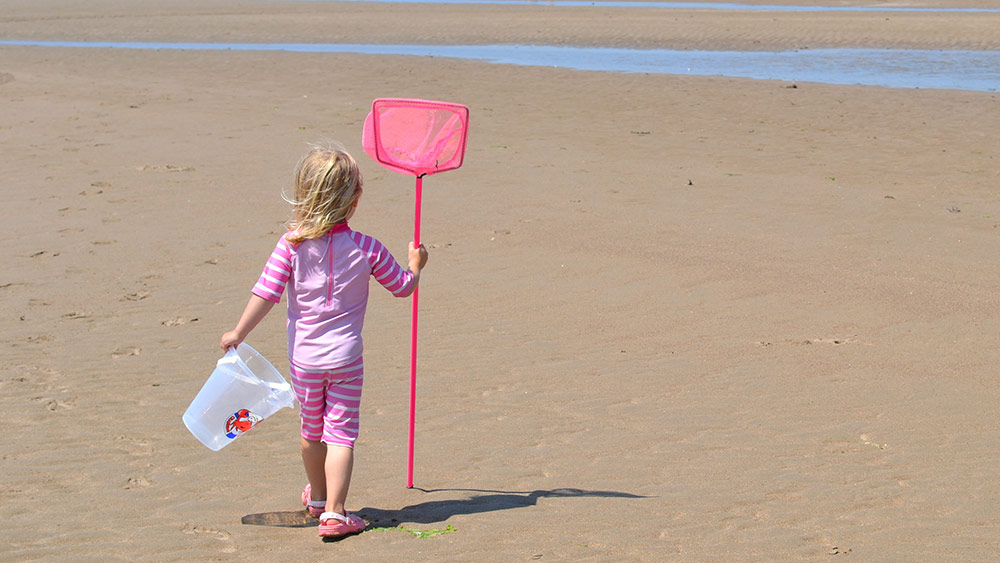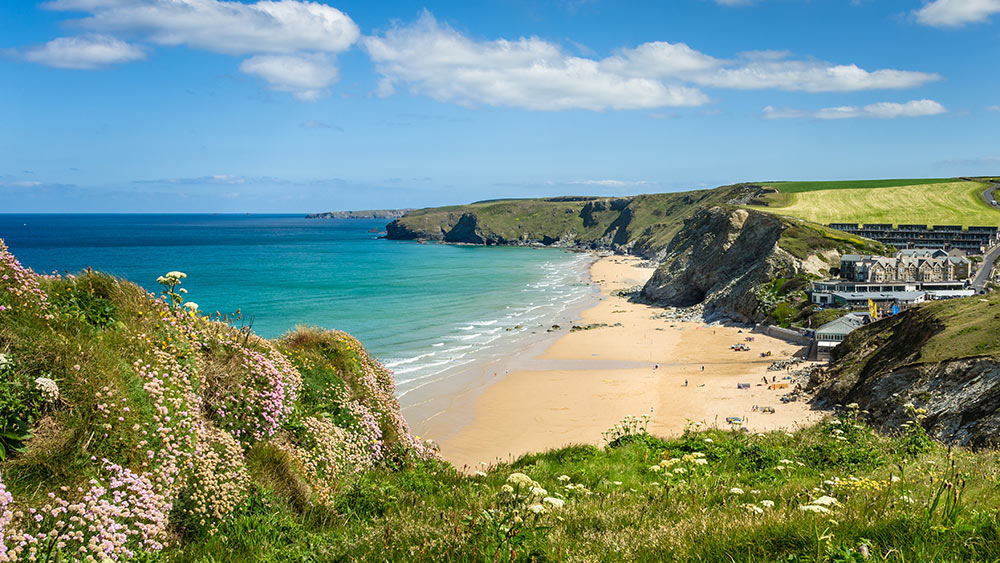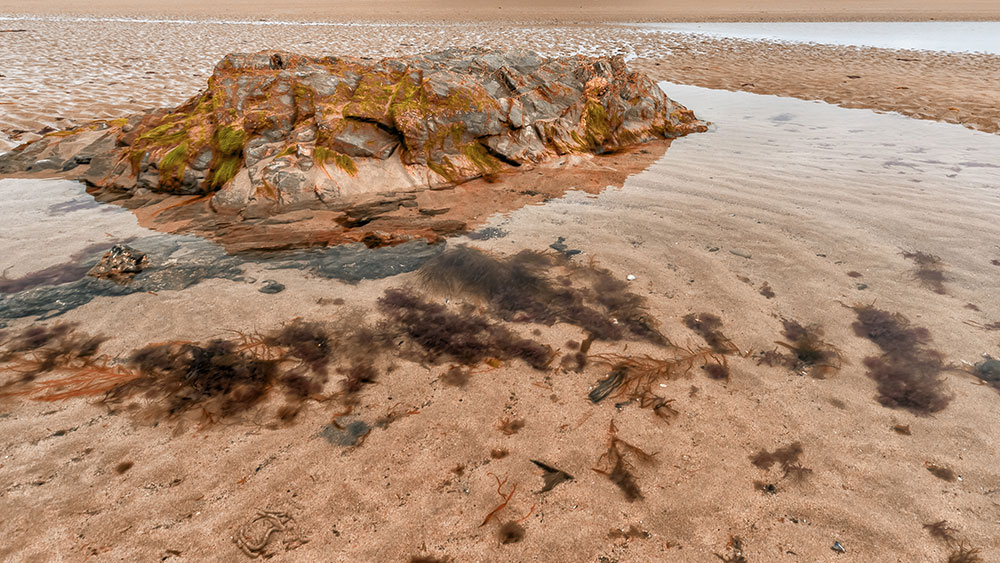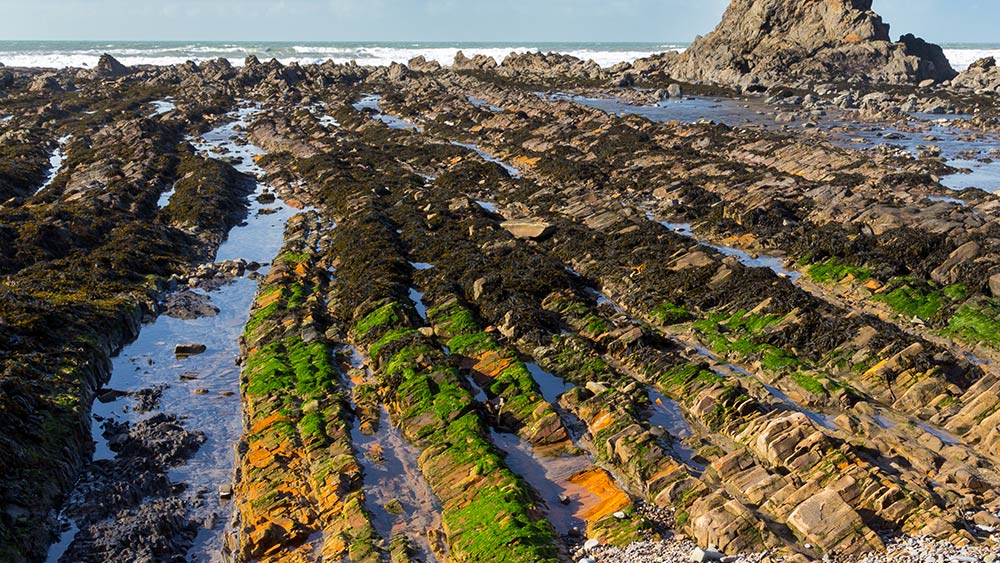Ultimate Guide to Rock Pooling in North Cornwall
All along the rugged and beautiful north coast of Cornwall are sunken worlds waiting to be explored.
Teeming with weird and wonderful marine life, these hidden, rocky habitats are exposed by the ebbing tide and provide hours of entertainment for all our budding naturalists.
Here’s our guide to some of north Cornwall’s best locations for rock pooling adventures. Grab your buckets and away we go.

Best Beaches for Rock Pooling in North Cornwall
Treyarnon Bay
Tucked away along the stunning Trevose Head Heritage Coast, not far from the historic port town of Padstow, lies Treyarnon Bay. Backed by dunes and flanked by low, grassy cliffs, this much-loved sandy shore is a rock poolers’ paradise. A maze of rocky crags and crevasses captures the retreating salt water, and with it a host of small sea creatures. Who knows what you might find lurking in the shallows? Treyarnon Bay is one of north Cornwall’s fabulous family beaches, full of secluded spots and ideal for beach games. At high tide, the local swells attract lots of surfers keen to ride the Atlantic rollers.
Watergate Bay
Not far from the bustling streets and bright lights of Newquay, Watergate Bay is a golden two-mile sweep lapped by sparkling turquoise waters. People flock to these precious shores, including a steady stream of water sports enthusiasts keen to ride the waves. Along the strandline and in amongst the rocky juts you can find secret and submerged habitats. See what sea life the ebbing tide has left behind when you explore these many spills, puddles and pools. You’ll find some bizarre looking lifeforms if you look closely enough, all of them wonderfully adapted to life on the Cornish north coast.

Greenaway
A craggy stretch of coastline between the dreamy shores of Daymer Bay and the sparkling of waters of Polzeath, Greenaway is renowned for providing endless rockpool adventures. Follow the South West Coast Path to discover this secluded beach and keep your eyes peeled as you scout along the many rocky dunks and saltwater hollows. A guidebook and magnifying glass will help you identify many of the incredible mini beasts that swim and scurry across your gaze. You could also take a quick snap of your rock pool finds and put names to your Cornish critters later. Always remember to stay one step ahead of the tides as they can sometimes be unpredictable.
Mawgan Porth
Flanked by tufted cliffs and combed by white sands, this enchanting setting on the fringes of the Trevose Head Heritage Coast is peppered by rocky enclaves that become crystal clear pools at times of low water. This quiet beach is great for families with adventurous youngsters who can run wild across the sugar-soft sands and explore the many crevasses, caves and inlets. Be on the lookout for green shore crabs, sand gobies, and even the black spotted spine of the butterfish which are sometimes seen weaving around the deeper pools. The beach does have seasonal lifeguards on patrol and is also dog-friendly subject to seasonal restrictions.

Newtrain Bay
There are rock pools aplenty along the shores of Newtrain Bay, also known as ‘Rocky Beach’. You could spend forever-and-a-day exploring the lapped shallows and rocky valleys, the perfect coastal landscape for all those with a net, a bucket, and an ever-curious mind. Rock pooling must be one of our guests’ favourite holiday activities, a brilliant way to learn about the local marine environment and a wonderful opportunity to enjoy the great outdoors. Be careful as you clamber the rocks and gibbers as they can sometimes be very slippery under foot.
Porth Mear
Nestled between the iconic sea stacks known as the Bedruthan Steps and the sweeping sands of Porthcothan Beach, Porth Mear is a rocky cove stippled by pools, some of which are very deep. Here, amongst the colourful seaweeds and clinging barnacles, you’ll find all manner of sea creatures lurking. Rock poolers generally catch glimpses of various small fish in amongst the crags, including the Cornish clingfish that uses a sucker on its belly to attach itself to rocks. Look out for a pair of striking blue dots on top of a duck-billed head.
Duckpool Beach
At the foot of an ancient wooded combe and only a handful of miles from the flamboyant seaside town of Bude, lies Duckpool Beach. This is another of north Cornwall’s lesser-known, but no less beautiful, shores. There are numerous rockpools to investigate once the tide has slinked away, shimmering windows into mysterious, sunken worlds. Many of the creatures that dwell in these curious habitats are masters of disguise, effortlessly camouflaging themselves to their surroundings. You might have to remain a tad patient before you see any signs of life, as even the smallest of splashes or ripples can make rockpool dwelling creatures freeze or dart for cover. Very carefully lift a stone or boulder and see what flashes or scurries out from under.

Rock Pooling Dos & Don’ts
- Do make sure you wear a sun hat and sunscreen.
- Do use a clear bucket so you can study the sea creatures more easily.
- Do make sure you’re aware of the tide times and movements. Low tide is generally the best time to go rock pooling.
- Do stay patient. Your initial splashes and ripples might cause some of the rock pool dwellers to dart and scurry for cover.
- Do be careful when negotiating slippery rocks. Don’t rush.
- Do gently lift rocks and stones to see what might be hiding beneath. Remember to gently place them back as you found them.
- Don’t forget to return all the sea life you’ve collected back from whence it came.
- Don’t forget to tell someone where you’re heading.
- Don’t leave children unsupervised.
- Do check the weather forecast and plan your route before you set off.
- Do respect the sea.
- Do have lots of fun.
